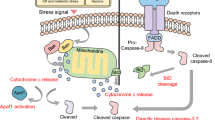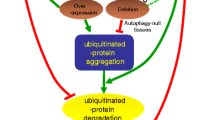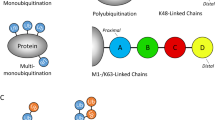Abstract.
The proteasome (multicatalytic proteinase complex, prosome) is a major cytoplasmic proteolytic enzyme, responsible for degradation of the vast majority of intracellular proteins. Proteins degraded by the proteasome are usually tagged with multiple ubiquitin moieties, conjugated to the substrates by a complicated cascade of enzymes. Over the last years, evidence has accumulated that changes in the expression and activity of the different components of the ubiquitin-proteasome system occur during apoptosis. Proteasome inhibitors have been used to induce apoptosis in various cell types, whereas in others, these compounds were able to prevent apoptosis induced by different stimuli. The proteasome mediated step(s) in apoptosis is located upstream of mitochondrial changes and caspase activation, and can involve in different systems Bcl-2, Jun N-terminal kinase, heat shock proteins, Myc, p53, polyamines and other factors.
Similar content being viewed by others
Author information
Authors and Affiliations
Additional information
Received 16 June 1999; received after revision 11 August 1999; accepted 25 August 1999
Rights and permissions
About this article
Cite this article
Wójcik, C. Proteasomes in apoptosis: villains or guardians?. CMLS, Cell. Mol. Life Sci. 56, 908–917 (1999). https://doi.org/10.1007/s000180050483
Issue Date:
DOI: https://doi.org/10.1007/s000180050483




